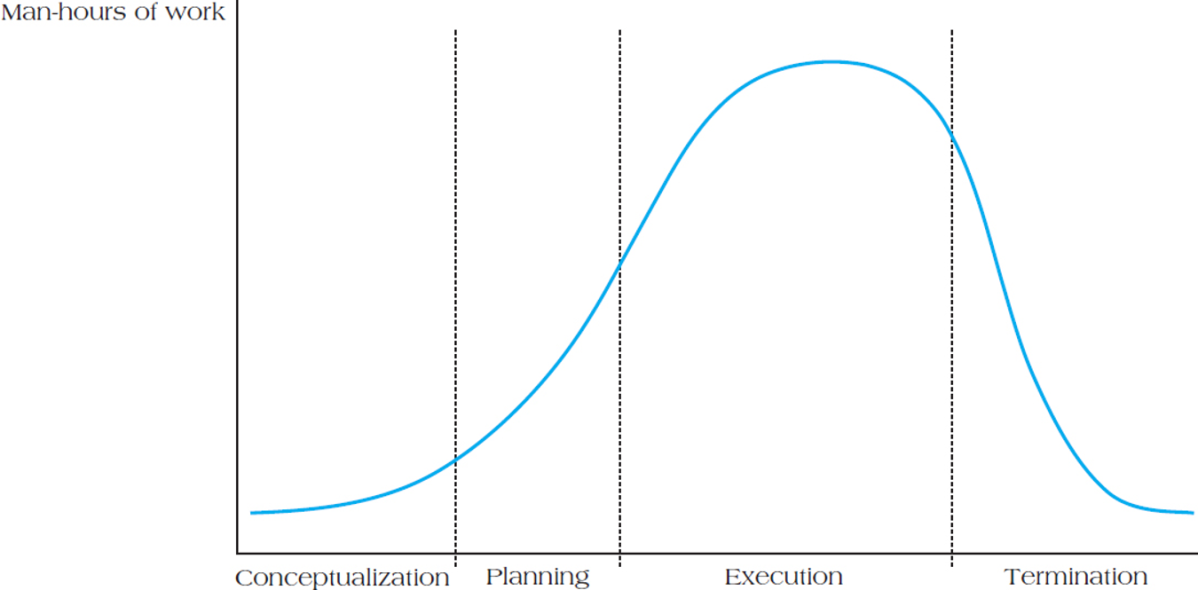Introduction
When it is necessary to conduct a project, it is reasonable to draw sufficient attention to quality assurance (QA). This term denotes “the process of identifying or deciding all the quality requirements for a project, identifying existing quality documents such as codes, specifications, etc. that are relevant to the quality requirements of the project” (Bhattacharjee 10). In other words, QA plans or finalizes quality targets for a specific project and comments on the ways to achieve the stipulated goals (Bhattacharjee 11). This information demonstrates that the concept under analysis should be incorporated into project management. In particular, QA can positively affect all the project life cycle stages, including conceptualization, planning, execution, and termination.
Discussion
To begin with, one should present the project life cycle stages. Figure 1 below demonstrates that individual stages include conceptualization, planning, execution, and termination. The first stage implies that one should identify project needs and demands. Planning refers to a thought process when responsible individuals develop objectives and define specific steps to achieve the goals. The following stage, execution, refers to actions that should be taken to perform the project. Finally, termination implies all steps that are required to complete the project. The visual demonstrates that different amounts of effort (defined as man-hours of work) are needed to meet the stipulated objectives. Thus, it is reasonable to determine how QA can affect the specified project life cycle stages.

Firstly, QA can positively affect the conceptualization stage because the given process can help achieve better outcomes. According to Ouabira and Fakhravar, QA ensures that a project meets internal and external expectations (87). While the internal aspect focuses on satisfying organizational needs, the external expectations refer to guaranteeing that the project meets all the stakeholders’ (including customers, government agencies, and employees) requirements (Ouabira and Fakhravar 87). This information demonstrates that reliance on QA can help responsible individuals cope with the conceptualization stage more effectively.
Secondly, since planning deals with developing objectives and steps to achieve them, it is reasonable to rely on QA to perform these tasks properly. One should admit that QA draws attention to proving that project development does not rely on erroneous requirements or assessments (Ouabira and Fakhravar 87). Simultaneously, this stage can benefit from QA because the latter helps ensure that there are no significant errors that can lead to reworking (Ouabira and Fakhravar 87). This information demonstrates that there is a positive relationship between QA and the planning stage, which can productively affect the entire project implementation.
Thirdly, Figure 1 above demonstrates that the execution stage requires the most time and effort. That is why it is necessary to rely on appropriate QA practices to guarantee that all the steps are properly implemented. According to Ouabira and Fakhravar, QA promotes correctness that “focuses on ensuring that the intended user requirements meet user and customer needs” (87). In other words, this quotation reveals that it is reasonable to rely on QA to ensure that actions help implement the project tasks and reckon on positive outcomes.
Fourthly, QA can positively impact the project termination stage. Ouabira and Fakhravar stipulate that QA draws significant attention to completeness since the given principle makes sure that “all elements needed to fulfill a certain quality requirement for a stakeholder are met” (87-88). If this condition is satisfied, it is possible that the project has met its objectives, which denotes that it is possible to terminate it.
Conclusion
In conclusion, the assignment has overviewed the concept of quality assurance and its relationships with project life cycle stages, including conceptualization, planning, execution, and termination. The analysis of the available literature has demonstrated that quality assurance can positively affect various project implementation stages. In particular, the concept provides recommendations on what tasks and aspects should receive the most attention to cope with a project successfully. This information denotes that it is reasonable to rely on the quality assurance principles for every project to ensure that its objectives can be met.
Works Cited
Bhattacharjee, Jay. “Quality Control and Quality Assurance in Building Construction.” International Research Journal of Management Science & Technology, vol. 9, no.4, (2018), pp. 10-16.
Ouabira, Monier Madison, and Hengameh Fakhravar. “Effective Project Management and the Role of Quality Assurance throughout the Project Life Cycle.” European Journal of Engineering and Technology Research, vol. 6, no. 5, (2021), pp. 84-88.